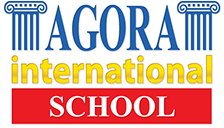The educational approach of the Agora International School is based on the theory of „multiple intelligences”(Howard Gardner) which assumes that a single style of teaching may not be appropriate to all the children. Therefore, our school encourages various educational methods and approaches, which is reflected in the diversity of the academic staff: teachers, coordinators of extra-curricular activities, which are specialized in their field (graduates in music, fine arts, religion, sports, psychology, etc).
Thus, during the day, pupils will meet with different teaching styles: from informal discussions around a round table to informational flashes offered on the laptop, from learning extracted from a conversational context to conventional presentations coordinated by the teacher, from the freedom offered by the painting paper to the original interpretation of a memorized role, and finally, from the competitive eagerness of the PE class to the fluidity offered by the musicality of the dance. Selected by the professionalism criterion professionalism, teachers’ activities are subsequently assessed, being trained during training days about alternative curriculum and new methods of teaching.
An aspect that is common to all the team members of AGORA is raising awareness of the role they have towards the children beyond the strict limits of the subject they teach. Thus, there is an emphasis on the role of all the teachers inpersonal and emotional development of children, making sure that we are adopting an open and permissive teaching style for communication, experiment and error. We believe that the success of the teaching process consists in the opportunity offered to the teacher to be himself or herself, creative, involved, passionate, informed.
Our educational offer is constructed in such a way that our pupils will develop on the following dimensions:
To learn to know
- to have access to knowledge, using autonomously resources and learning strategies;
- to develop their own working and learning style;
- to enrich their understanding about the world through the integration of new knowledge in their own universe of reference;
- to be motivated to learn.
To learn to make
- to apply creatively knowledge, skills in new situations;
- to solve work tasks specific to various fields (humanities and applied sciences, arts, sport, technologies), through modern learning approaches and methods (interface, trans-interface, theory of multiple intelligences, interactive methods);
- to explore reality in multiple perspectives;
- to develop the initiative spirit.
To learn to live together with the others
- to develop social skills (communication, interaction, participation, adaptation, cooperation, conflict resolution);
- to acquire interpersonal skills (tolerance, flexibility, respect, interest for the others);
- to participate in joint projects.
To learn how to be
- to acquire a system of values and principles;
- to develop their personality features (reflexivity, creativity, emotional balance);
- to discover and to assert their own inclinations;
- to develop physical skills through sports and to acquire aesthetic sense.


